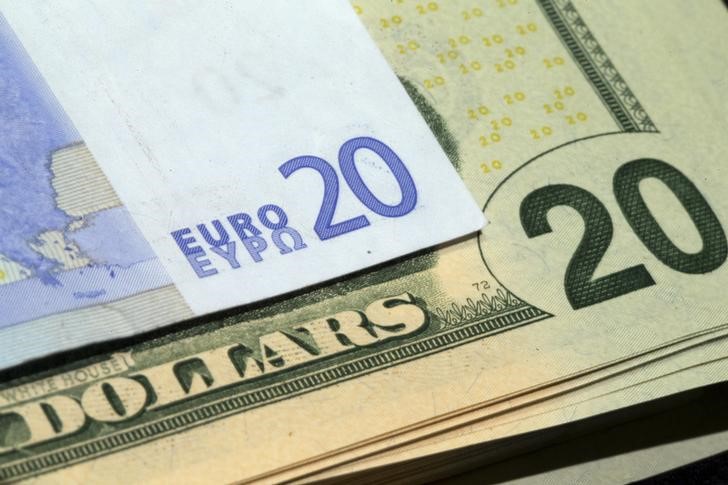Investing.com - The euro fell to the lowest level in nearly seven weeks against the dollar on Friday, as upbeat U.S. economic data highlighted the diverging monetary policy outlook between the Fed and the European Central Bank.
EUR/USD declined 0.41% to 1.0831 late Friday after falling to 1.0829 earlier in the session, the weakest level since May 27. The single currency lost 3% against the greenback on the week, the worst weekly performance in two months.
Data on Friday showed that U.S. consumer prices rose 0.3% in June, the fifth consecutive monthly increase, while core prices, which exclude food and energy, increased 0.2% last month, adding to signs of firming inflation.
A separate report showed that U.S. housing starts surged 9.8% to 1.174 million units in June. Analysts had expected housing starts to increase by 6.2% last month.
U.S. building permits jumped 7.4% to 1.343 million units in June, the most since July 2007, pointing to a rapidly strengthening housing market.
Federal Reserve Chair Janet Yellen said earlier in the week that the central bank was on track to raise interest rates by the end of the year if the economy continues to grow as expected.
The U.S. dollar index, which measures the greenback’s strength against a trade-weighted basket of six major currencies, inched up 0.3% to end at 98.09 late Friday, the strongest level since April 23.
For the week, the index rose 1.9%, the biggest weekly gain since May, amid growing indications that a rate hike is coming in the U.S. later this year.
The euro also tumbled against the pound after Bank of England Governor Mark Carney said earlier in the week that the time for the bank to raise rates from record lows is moving closer.
EUR/GBP lost 0.32% to close the week at 0.6946, a level not seen since November 2007.
Investors continued to monitor developments surrounding Greece's debt crisis. Germany's parliament approved a government request to open talks on a much-needed bailout program for Greece on Friday, which could provide Athens with up to €86 billion over a period of three years.
Also Friday, the European Union agreed to give Greece a €7.16 billion bridging loan from the European Financial Stabilization Mechanism (EFSM) to keep its finances afloat until a bailout is approved.
The news came after the ECB increased its emergency lending to Greek banks by €900 million, which would allow them to reopen after being closed for nearly three weeks.
In the week ahead, market players will focus on U.S. data on home sales and jobless claims for further indications on the strength of the economy and the timing of an interest rate hike.
Manufacturing data from China and the euro zone will also be in focus.
Ahead of the coming week, Investing.com has compiled a list of these and other significant events likely to affect the markets. The guide skips Monday and Tuesday as there is no relevant data on these days.
Wednesday, July 22
The U.S. is to release private sector data on existing home sales.
Thursday, July 23
Spain is to release its quarterly employment report.
Later Thursday, the U.S. is to report on initial jobless claims.
Friday, July 24
China is to publish the preliminary reading of the HSBC manufacturing index.
The euro zone is to release survey data on private sector activity.
The U.S. is to round up the week with reports on manufacturing activity and new home sales.
